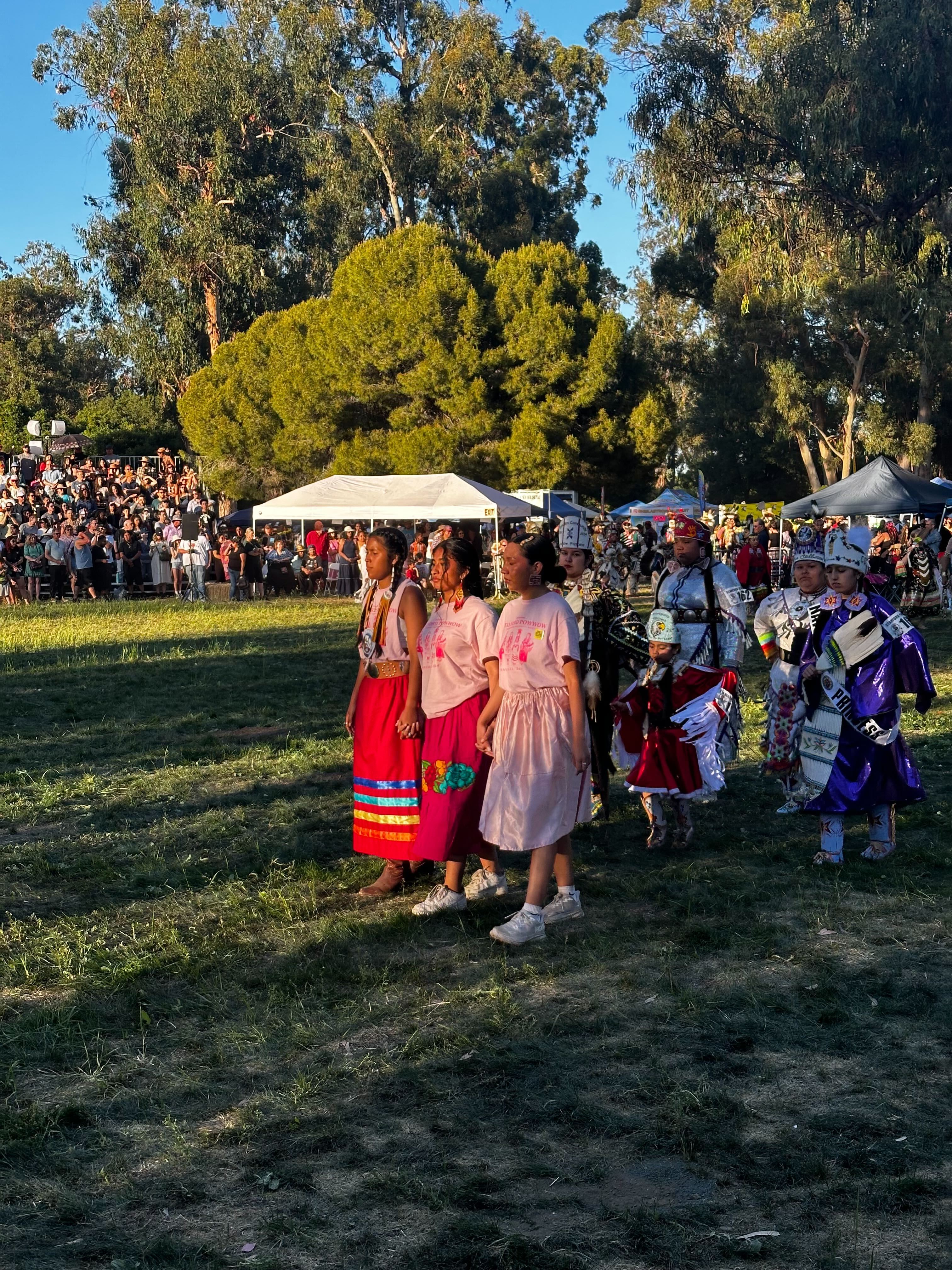Zola Ortiz ’27 has been attending powwows for as long as she can remember. Last weekend, as she stepped into Eucalyptus Grove wearing regalia gifted to her by her mother, Ortiz continued a tradition she has carried on since elementary school, as a dancer at Stanford’s 53rd Annual Powwow.
“It’s so powerful to enter into an arena and see a bunch of Native people all around you,” Ortiz said.
Stanford hosts the largest student-run powwow in the U.S., attracting 20,000 to 30,000 attendees every year, said Powwow Committee co-chair Julia Perez-Pacheco ’26. The event, which occurred last weekend, featured competitive tribal dances, food stalls selling treats like strawberries on frybread, booths run by Indigenous art vendors and a 5k fun run/walk.
“Our goal was to bring a great event to the community and make sure that the Indigenous community has a space on campus, because oftentimes we don’t have that representation,” Perez-Pacheco said.
The powwow began on Friday at 5 p.m. with the opening of the “Indian Art Market,” as Indigenous vendors set up stalls to sell handcrafted jewelry, clothing, shawls and other wares around the edges of Eucalyptus Grove. Each day of the event was marked by a “grand entry,” when flag-bearers and dancers wearing feathered traditional regalia streamed into an arena in the center of the Grove.
The sounds of drum beats, joyous singing and ringing bells could be heard throughout the day as dancers representing different tribes competed in a three-day contest. Dancers competed based on age categories and the type of dance they participated in, with Ortiz dancing in a traditional Southern style.
“Even though there’s usually different styles, any form of dance is rooted in healing,” Ortiz said.
Perez-Pacheco said that this year saw “record-breaking numbers” of attendees, including thousands coming from out of state, traveling from as far away as the East Coast and Canada. Some camped on campus for the weekend.
An all-women team of co-chairs — Perez-Pacheco, Sophia Allan ’26 and Nena Naat’aanii Dorame ’25 — led the event. They chose this year’s theme, “Empowering Indigenous Women.”
Perez-Pacheco said that their theme selection was partly inspired by the Missing and Murdered Indigenous Women movement and the need to “honor the women who are no longer here with us.”
“There’s a lot of sadness in our community, and so we wanted to shed light on the positivity of being Indigenous … and to show the strength within Indigenous women,” Perez-Pacheco said.
Ortiz said this year’s theme resonated with her experiences as an Indigenous woman.
“I’ve been so grateful to be surrounded by such strong Native women who are so capable of leading, of loving, of leadership,” Ortiz said. “I think that it’s important to honor those women.”
In addition to the dances and contests held throughout the powwow, the event featured an honor song for Native graduating seniors at Stanford. Amid the sound of resounding drums, the students joined hands as they walked through the arena.
Ryan Duncan ’24 M.A. ’24 is one of the graduating seniors who was honored. Duncan served as a Powwow co-chair in 2022, the first year the event returned in-person after two years online during the COVID-19 pandemic. He was excited to see that attendance for the event is rebounding after emerging from virtual powwows.
“I think everybody is realizing that Stanford Powwow is back on,” Duncan said.
The Muwekma Ohlone Tribe, the original inhabitants of the land Stanford sits on, was also honored at Powwow this year with a performance by the Muwekma Ohlone Dance Group.
“Today was the third time we have been asked to dance on our own homelands,” said Muwekma Ohlone Tribal member and ambassador Julie Dominguez. She said that the Tribe’s consistent presence at Powwow is important for the “revitalization of our dance, our songs, our language and our culture and spirituality.”
Dominguez, alongside Muwekma Ohlone Tribal Chairwoman Charlene Nijmeh, staffed a “Justice for Muwekma” booth at Powwow that shared information about the Tribe’s efforts to gain federal recognition.
According to Dominguez, the Muwekma Ohlone plan to demand federal recognition from government leaders by embarking on a “Trail of Truth” starting on Aug. 1. Advocates from the Tribe will travel on horseback from the Bay Area to Washington D.C., with other federally unrecognized tribes joining them along the way.
“We want to bring that call to action that we’re still here, and we all deserve that justice to be recognized,” Dominguez said.
Attending Powwow was a “beautiful” experience for Stanford alumni Keoni Rodriguez ’22 M.A. ’23, who returned to the event after serving as an organizer during their time as a student.
Rodriguez said their favorite aspect of Powwow was the leadership of the event’s student organizers, who worked since fall quarter to make the event happen despite the stresses of midterms and schoolwork. Rodriguez was also impressed to see large crowds of volunteers and attendees still at Powwow late into the night.
“There’s so many booths and vendors and people who are maybe not even part of the Native community, but are still here, volunteering and attending,” Rodriguez said. “That’s really special.”
